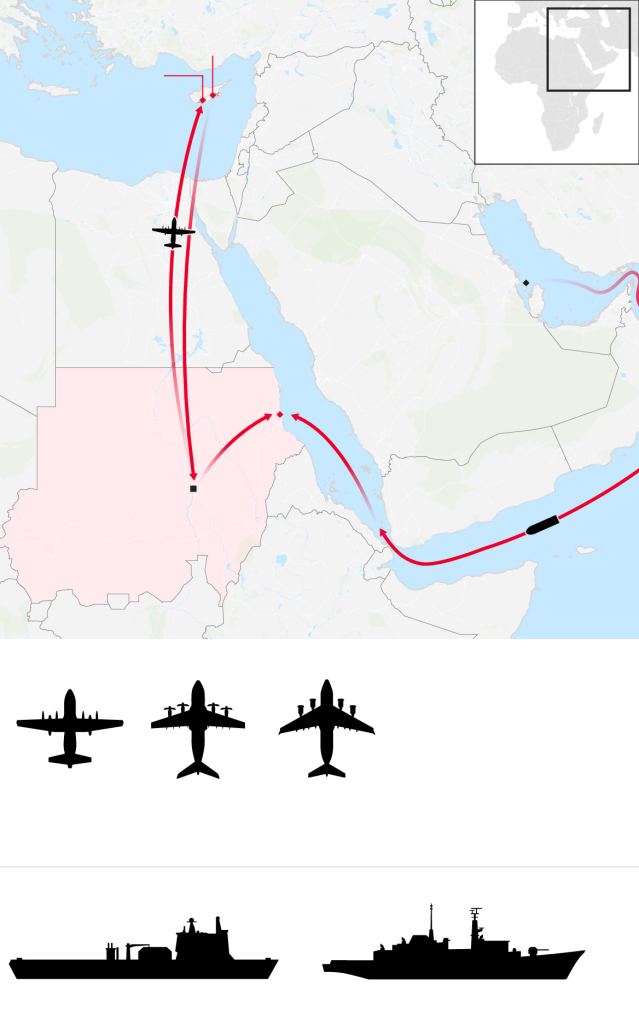British man forced to leave wife and son to catch Sudan evacuation flight
Imperfect ceasefire has split up numerous families desperate to escape the violence still claiming lives across the country
Sponsored Images





A British bus driver who was forced to flee Khartoum without his wife and son was terrified for their safety on Thursday night as the end of a fragile ceasefire approached.
Adam Ahmed found himself cut off from his loved-ones, who were trapped in a highly volatile part of the city, meaning he could not take them with him to the RAF rescue flight.
His is one of countless families torn apart by the recent violence – and by a ceasefire that was renewed for another 72 hours – but appears never to have truly taken hold in parts of the Sudanese capital.
Speaking from the safety of the Larnaca Airport in Cyprus, Mr Ahmed told The Telegraph: “It’s very tough to move from one place to another [in Khartoum]. You could lose your life just like that.”

Despite frantic diplomatic efforts, the country appeared to be spiralling towards all-out violence, prompting a warning from the Foreign Secretary on Thursday that further evacuation could be “potentially impossible”.
As the ceasefire drained away on Thursday, African countries and the United States scrambled to negotiate an extension, even as airstrikes and anti-aircraft fire were heard in Khartoum and the nearby cities of Omdurman and Bahri.
The fragile window has been crucial to the British evacuation operation, now in its third day, which by Thursday afternoon had allowed 900 of its citizens to be airlifted from Sudan to Cyprus, with about half of those repatriated to the UK.
Two RAF evacuation flights landed at Larnaca in Cyprus on Thursday, with more expected.
Ministers urged those remaining in the conflict-riven country to grasp an opportunity to leave during the final hours of a ceasefire.
“Now is the time to move because when the ceasefire ends, my ability to give the kind of limited assurance I can give now might go and we might not be able to evacuate,” said James Cleverly, the Foreign Secretary.
Hundreds of people have been killed in the capital Khartoum in nearly two weeks of conflict between the army and a rival paramilitary force – the Rapid Support Forces (RSF) – which are locked in a power struggle threatening to destabilise the wider region.
The apparent success of Britain’s evacuation operation was, however, overshadowed on Thursday by a diplomatic spat, with the German defence minister publicly criticising the UK for its mission to extract British diplomats last weekend.
Boris Pistorious said that by doing so without appropriate authorisation, Britain had angered the Sudanese army into temporarily withdrawing landing permissions that had delayed other nations’ evacuation schemes.
Downing Street said it did not recognise the claims, while the Ministry of Defence described them as “complete nonsense”.
The decision to land at Wadi Seidna airfield without authorisation caused “astonishment”, according to a senior political source in Berlin. “It was not exactly professional,” the source told The Telegraph.
Evacuation missions from Germany and other countries were then disrupted for several hours as angered Sudanese authorities withdrew landing permissions, the source said.
“It is not accurate to suggest that Britain’s efforts to evacuate embassy staff from Sudan last weekend slowed down Germany’s plans,” said the spokesperson for Prime Minister Rishi Sunak.
“We have been working extremely closely with our French, US and German partners.”
But the source in Berlin told The Telegraph that the events, first reported by the BBC, happened “without doubt”.
Mr Ahmed was a bus driver in Bedfordshire before returning to Sudan in 2014 to focus on farming.
He told The Telegraph that his wife Mageel and son Ahmed were trapped in the north of Khartoum, but that trying to reach them could be a death sentence.
“I feel very bad,” said the 60-year-old, holding back tears. “There is fighting in that part of the city. It’s very tough to move from one place to another.
“I am in contact with them, but sometimes there is no signal or internet.”
The Sudanese army has suggested it could be amenable to African and American proposals to extend the ceasefire.
The army late on Wednesday said its leader, General Abdel Fattah al-Burhan, had given initial approval to the plan to extend the truce for another 72 hours and to send an army envoy to the South Sudan capital, Juba, for talks.
However, the RSF issued a statement accusing the army of attacking its forces and spreading “false rumours”, while not referring to the proposal.
Despite the intense diplomatic efforts to extend it, some British passport holders who had reached the safety of Cyprus were scathing about the ceasefire.
Nader Omar, an emergency medicine doctor, said bodies had literally been piling up outside his house.
“They kill each other in front of our house,” he said. “The bodies are lying in the street.
“The situation is ugly, very bad – no water, no food. We had no choice, we had to go.”
In a further example of the wrench caused by the violence on families, his wife, Maha, said: “My mother is disabled and still in Khartoum, and my brother and sister.
“We need to contact her but we can’t get through.”
Another family, that of Kamal Hashim, 63, an aircraft technician at RAF Valley in north Wales, very nearly did not make it to the waiting RAF transport plane at the Wadi Saeedna airstrip.
While trying to leave Omdurman, he and his wife and three daughters were caught in the crossfire of a battle between rival forces.
“It came very close,” he said. “You can see them shooting each other and we were in the middle, driving.”
“For them,” pointing at Lena, 7, Ahmed, 9, and Danya, 15, “it was very scary.”
In the Commons, Mr Cleverly defended its advice to citizens caught in the country.
He said it was better to give general advice for how to navigate through Sudan to the evacuation point because specific advice can go out of date very quickly and put recipients in danger.
“The travel advice that we give has to enhance the safety of British nationals overseas and not inadvertently put them at a greater risk.
“And there is often a lag – there is a lag between us finding out information, broadcasting that information, and that information acted upon, and one of the things that we have seen, not directly because of advice the UK has given, but the advice that other governments have given, is that they have inadvertently called people into more dangerous circumstances and those people have found themselves under attack, so we have to give general advice.”
The Royal Navy frigate HMS Lancaster sailed towards the Red Sea port of Port Sudan to continue evacuations if it becomes too dangerous to fly into the country.
Meanwhile on Thursday France said it had managed to evacuate British citizens in its latest operation.
In Cyprus, the stories mounted of terror and near misses from British passport holders trying to make it to safety.
Elfatih Abdelrahman, 61, father-of-five, business owner who lives in Manchester was also sceptical about the ceasefire.
Describing his flight from Omdurman to the airstrip, he said: “We were afraid because anytime they might tell you to stop, and if you don’t they might shoot you.
“Luckily, we were told to just keep going each time.
“You hear gunfire everywhere, even when we were at the airbase we heard gunfire from outside in the distance.”
Family told ‘no evacuation flights’
After an anxious 10-day wait, Mohammed Baldo, 35, an architect from Ealing, was on Thursday night reunited with his wife, Somaya, 26, and two-year-old daughter Layla, who were on holiday in Khartoum when the fighting broke out.
He watched international evacuation efforts get underway on the news, as UK government officials advised him to tell his family to “stay put” as his wife is not British.
Exasperated, he decided to bypass official channels and urged his wife to head to the airfield.
Mr Baldo said his wife rented a minibus on Tuesday, driving her daughter and father – who remains in the country – to the Wadi Saeedna airfield.
“They were stopped multiple times during the hour and a half drive by the RSF and by the army, questioning them and telling them there’s no evacuation flights,” he told The Telegraph.
“They were being hindered,” Mr Baldo said of his family’s dart for the airbase. “It was a very traumatic experience. They were crying, my daughter was crying.”
When Ms Baldo and her daughter arrived at the airfield they were allocated a spot on the last British flight out of the war-torn capital on Wednesday night — only to be turned away from the plane as they were about to board.
Eventually, Ms Baldo and her daughter were able to board a later flight, and the family was reunited in a hotel lobby after being flown on to Britain from Cyprus.
Dear Readers, Good and credible news reportage is tedious task and requires huge finances.
We are soliciting your Noble support for as low as N1,000 your support would go a long way in assisting us to continue to guarantee our readers quality news.
Bank transfers can be made to:
Account Name: Harvest and Commercial
Bank: Sterling Bank
Account Number: 0078627735